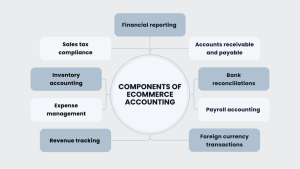
Discover crucial accounting terms every online seller needs to know to manage finances better and ensure business success.
Running an ecommerce store involves more than just selling great products. As a business owner, you need to understand important accounting concepts to keep your finances on track. Knowing these terms helps you make sense of your financial data, plan for taxes, and measure your store’s success. Without a grasp of basic accounting terms, managing your business can become confusing. It’s crucial to know how to read financial statements and understand key tax and bookkeeping concepts. When you understand these terms, you can make informed decisions and avoid potential pitfalls. This article will introduce you to key accounting terms that every ecommerce seller should know. By familiarizing yourself with these concepts, you can take control of your business’s financial health and create a solid foundation for growth.
Understanding Basic Financial Statements
Getting a grip on basic financial statements is crucial for running an ecommerce business. These statements provide insights into your business’s financial health and help you make informed decisions. The three key financial statements are the income statement, balance sheet, and cash flow statement. The income statement shows your revenue and expenses over a period, revealing whether your business made a profit or suffered a loss. It breaks down sources of income and types of expenses, helping you understand where your money goes. The balance sheet provides a snapshot of your business’s assets, liabilities, and equity at a specific point in time. Assets include inventory, cash, and equipment. Liabilities are your debts and obligations. The balance sheet helps you assess your business’s financial position. The cash flow statement tracks the flow of cash into and out of your business. It highlights how well your business generates cash to fund operations, pay debts, and invest in future growth. There are three sections: operating, investing, and financing activities. Each section shows a different aspect of your financial interactions. Understanding these statements gives you a clearer picture of your business operations. Analyzing them regularly helps in strategizing growth and pinpointing areas that need attention.
Key Tax Terms for Ecommerce Sellers
Familiarizing yourself with key tax terms eases the burden of tax season. Ecommerce sellers deal with several tax concepts that are important to grasp for smooth tax filing. Sales tax is one of the main concerns for online sellers. It’s a tax on sales of products and services, with rates varying by state and location. Knowing where you have sales tax nexus—meaning a business presence—is crucial for compliance. Income tax affects your business based on the profit you make. It’s essential to track revenue and expenses accurately for preparing your tax returns. Deductions play a vital role by reducing taxable income. Common deductions for ecommerce include advertising, home office expenses, and internet costs. Keeping detailed records helps maximize your savings. A tax ID, or Employer Identification Number (EIN), is a unique number for your business. It identifies your business to tax authorities and is necessary when filing taxes or opening a bank account. Understanding these terms is important for handling taxes efficiently. It ensures you’re prepared to meet your obligations without unnecessary stress or errors.
Important Bookkeeping Concepts
Bookkeeping is essential for keeping track of your ecommerce business’s financial health. It involves recording financial transactions systematically, making it easier to manage your finances and prepare for tax season. Understanding key bookkeeping concepts helps maintain accurate records and ensures your business runs smoothly. Start by setting up a system to track all incoming and outgoing cash. Use bookkeeping software to automate this process, reducing errors and saving time. Consistency in logging each transaction, from sales to expenses, is vital. Chart of accounts is a list of all accounts your business uses. It organizes financial transactions into categories like assets, liabilities, revenue, and expenses. A well-structured chart helps in generating financial statements and tracking financial performance. Bank reconciliation involves comparing your internal records with bank statements to ensure consistency. This practice catches discrepancies and helps prevent fraud. Doing it monthly keeps your records accurate. Double-entry accounting is a principle where every transaction affects at least two accounts, maintaining balance in the accounting equation (Assets = Liabilities + Equity). This method provides a more accurate picture of your financial health. Understanding these concepts ensures you have a clear picture of your financial standing and makes tax time less stressful. Accurate bookkeeping supports informed decision-making and business growth.
Navigating Inventory and Cost of Goods Sold (COGS)
Managing inventory and understanding Cost of Goods Sold (COGS) is crucial for an ecommerce business. These elements affect your profitability and require careful tracking to maintain a healthy business. Inventory management involves keeping track of the products you have for sale. Efficient inventory management prevents stockouts and overstock, which can impact customer satisfaction and cash flow. Use inventory management software to monitor stock levels and reorder products as needed. COGS refers to the direct costs of producing the goods sold by your business. This includes the cost of materials and labor directly tied to production. Accurately calculating COGS helps determine your gross profit and ensures your product pricing covers these costs.
To calculate COGS, use the formula:
\[ COGS = Beginning Inventory + Purchases – Ending Inventory \]
This calculation needs consistency and accuracy, as it affects your profitability analysis and tax reporting. Regularly reviewing COGS and inventory levels enhances your ability to strategize pricing, promotions, and procurement processes. This practice supports a more efficient operation and aids in maintaining a competitive edge in the market.
A strong understanding of financial statements, tax terms, bookkeeping, and inventory management sets the foundation for a successful ecommerce business. By implementing effective systems and practices, you ensure smoother operations and a clearer view of your business’s financial health. These efforts lead to better decision-making and create opportunities for growth. Looking for expert help to tackle your ecommerce accounting challenges? The Ecommerce Accountants can assist you with every aspect of accounting and bookkeeping tailored to your specific needs. Contact us today to learn more about our ecommerce accounting services to ensure your business is financially optimized and prepared for success.






